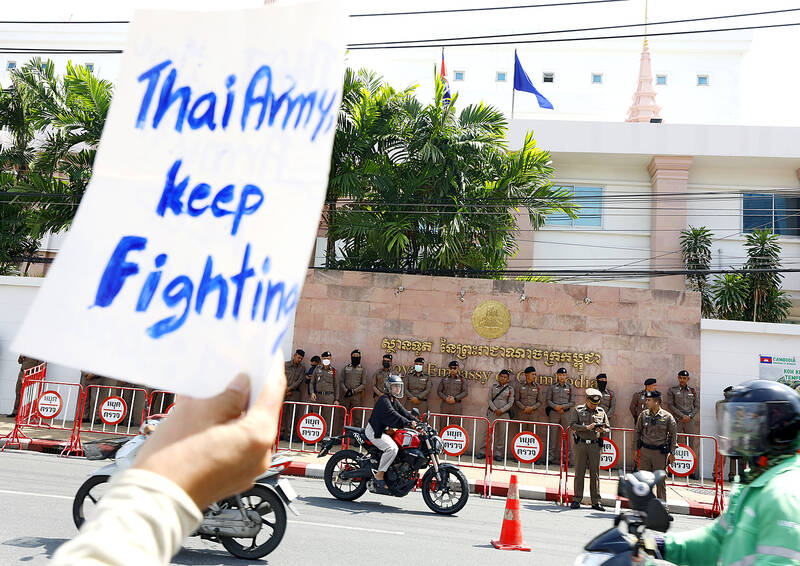Thailand has reinforced its military presence along a disputed border with Cambodia, following an increase in troops on the other side, Thai Deputy Prime Minister and Minister of Defense Phumtham Wechayachai said yesterday.
Tensions between the two Southeast Asian countries have been simmering since a Cambodian soldier was killed on May 28 in a brief skirmish in an undemarcated border area. For days, the two Southeast Asian governments have been exchanging carefully worded statements committing to dialogue.
However, Phumtham said Cambodia had rejected proposals in bilateral talks held on Thursday that could have led to a de-escalation.

Photo: EPA-EFE
“Furthermore, there has been a reinforcement of military presence, which has exacerbated tensions along the border,” Phumtham said in a statement. “Consequently, the Royal Thai Government has deemed it necessary to implement additional measures and to reinforce our military posture accordingly.”
He did not provide details on the extent of reinforcements by either side.
In a separate statement yesterday, the Thai army said Cambodian soldiers and civilians had repeatedly made incursions into Thailand’s territory.
“These provocations, and the buildup of military forces, indicate a clear intent to use force,” the Thai army said, adding that it would take control of all Thai checkpoints along the border with Cambodia.
A spokesperson for Cambodia’s Ministry of Foreign Affairs and International Cooperation did not immediately respond to questions from Reuters on the Thai army’s announcement.
“This is our stance, not to initiate conflict, but to defend ourselves,” Cambodian Prime Minister Hun Manet said in a speech yesterday.
“Our guiding principles are ... respect for international legal frameworks. These grounded strategies are key to safeguarding our nation’s sovereignty,” he said, adding that its armed forces were ready to defend against aggression.
The military reinforcements come despite efforts by Malaysian Prime Minister Anwar Ibrahim, who is the current chair of the ASEAN bloc, and China to reduce tensions.
Thailand and Cambodia have for more than a century contested sovereignty at various undemarcated points along their 817km land border, which was first mapped by France in 1907, when Cambodia was its colony.
Tensions escalated in 2008 over an 11th-century Hindu temple, leading to skirmishes over several years and at least a dozen deaths, including during a week-long exchange of artillery in 2011.
However, the current governments in both countries have enjoyed warm ties. Former Thai prime minister Thaksin Shinawatra and former Cambodian prime minister Hun Sen have had a close relationship, and Thaksin’s daughter and Hun Sen’s son are now the incumbent prime ministers of their countries.
Still, nationalist sentiment has risen in Thailand, and the Thai military on Friday said it is ready to launch a “high-level operation” to counter any violation of its sovereignty.
Cambodia this week said it would refer disputes over four parts of the border to the International Court of Justice and asked Thailand to cooperate.
Phumtham reiterated in his statement yesterday that Thailand does not recognize the jurisdiction of the court and proposed that all boundary-related issues be resolved through bilateral negotiations.

Packed crowds in India celebrating their cricket team’s victory ended in a deadly stampede on Wednesday, with 11 mainly young fans crushed to death, the local state’s chief minister said. Joyous cricket fans had come out to celebrate and welcome home their heroes, Royal Challengers Bengaluru, after they beat Punjab Kings in a roller-coaster Indian Premier League (IPL) cricket final on Tuesday night. However, the euphoria of the vast crowds in the southern tech city of Bengaluru ended in disaster, with Indian Prime Minister Narendra calling it “absolutely heartrending.” Karnataka Chief Minister Siddaramaiah said most of the deceased are young, with 11 dead

DENIAL: Musk said that the ‘New York Times was lying their ass off,’ after it reported he used so much drugs that he developed bladder problems Elon Musk on Saturday denied a report that he used ketamine and other drugs extensively last year on the US presidential campaign trail. The New York Times on Friday reported that the billionaire adviser to US President Donald Trump used so much ketamine, a powerful anesthetic, that he developed bladder problems. The newspaper said the world’s richest person also took ecstasy and mushrooms, and traveled with a pill box last year, adding that it was not known whether Musk also took drugs while heading the so-called US Department of Government Efficiency (DOGE) after Trump took power in January. In a

By 2027, Denmark would relocate its foreign convicts to a prison in Kosovo under a 200-million-euro (US$228.6 million) agreement that has raised concerns among non-governmental organizations (NGOs) and residents, but which could serve as a model for the rest of the EU. The agreement, reached in 2022 and ratified by Kosovar lawmakers last year, provides for the reception of up to 300 foreign prisoners sentenced in Denmark. They must not have been convicted of terrorism or war crimes, or have a mental condition or terminal disease. Once their sentence is completed in Kosovan, they would be deported to their home country. In

LOST CONTACT: The mission carried payloads from Japan, the US and Taiwan’s National Central University, including a deep space radiation probe, ispace said Japanese company ispace said its uncrewed moon lander likely crashed onto the moon’s surface during its lunar touchdown attempt yesterday, marking another failure two years after its unsuccessful inaugural mission. Tokyo-based ispace had hoped to join US firms Intuitive Machines and Firefly Aerospace as companies that have accomplished commercial landings amid a global race for the moon, which includes state-run missions from China and India. A successful mission would have made ispace the first company outside the US to achieve a moon landing. Resilience, ispace’s second lunar lander, could not decelerate fast enough as it approached the moon, and the company has